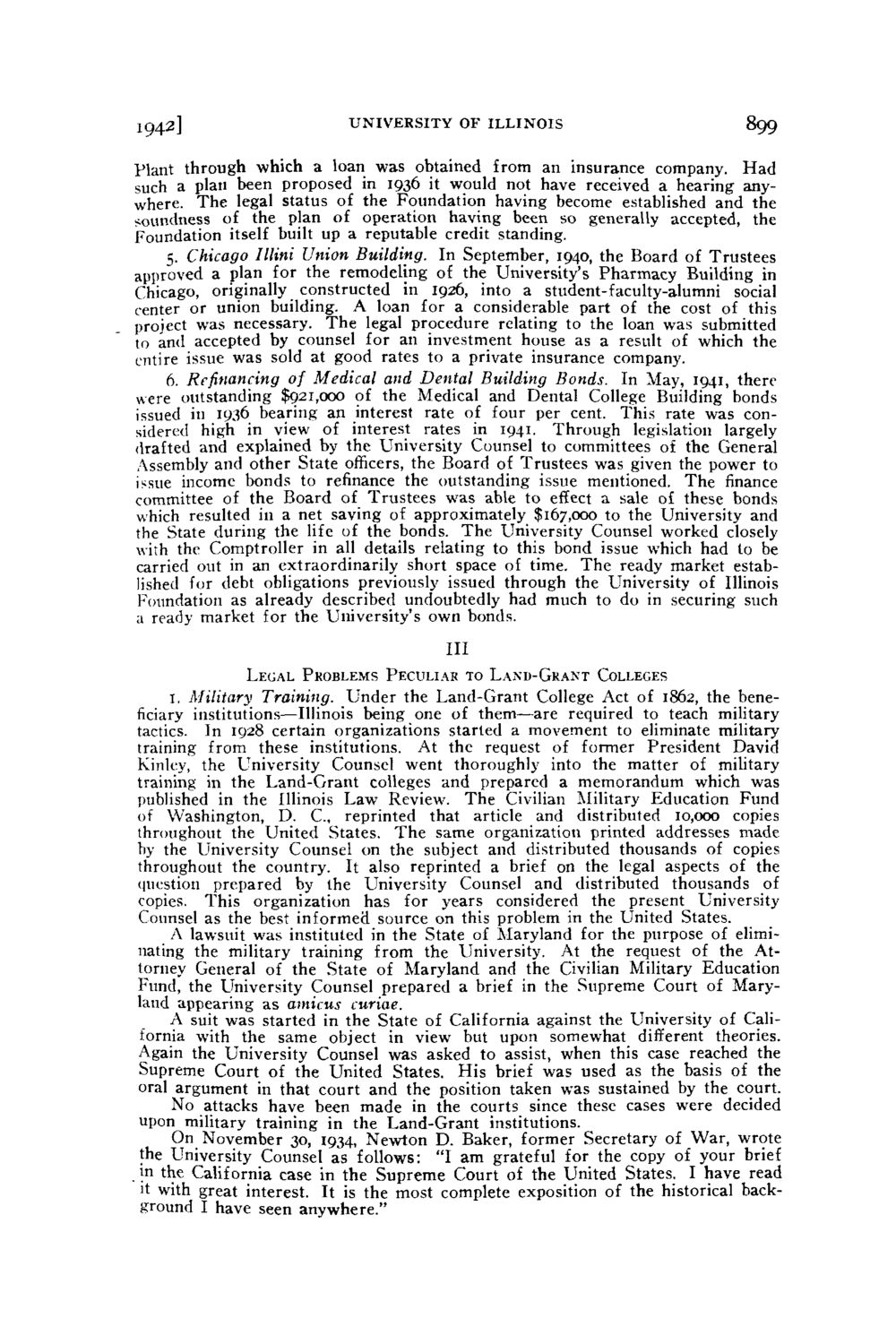| |
| |
Caption: Board of Trustees Minutes - 1942
This is a reduced-resolution page image for fast online browsing.

EXTRACTED TEXT FROM PAGE:
1942] U N I V E R S I T Y OF I L L I N O I S 899 Plant through which a loan was obtained from an insurance company. H a d such a plan been proposed in 1936 it would not have received a hearing anywhere. The legal status of the Foundation having become established and the soundness of the plan of operation having been so generally accepted, the Foundation itself built up a reputable credit standing. 5. Chicago Illini Union Building. In September, 1940, the Board of Trustees approved a plan for the remodeling of the University's Pharmacy Building in Chicago, originally constructed in 1926, into a student-faculty-alumni social center or union building. A loan for a considerable part of the cost of this project was necessary. The legal procedure relating to the loan was submitted to and accepted by counsel for an investment house as a result of which the entire issue was sold at good rates to a private insurance company. 6. Refinancing of Medical and Dental Building Bonds. In May, 1941, there were outstanding $921,000 of the Medical and Dental College Building bonds issued in 1936 bearing an interest rate of four per cent. This rate was considered high in view of interest rates in 1941. Through legislation largely drafted and explained by the University Counsel to committees of the General Assembly and other State officers, the Board of Trustees was given the power to issue income bonds to refinance the outstanding issue mentioned. The finance committee of the Board of Trustees was able to effect a sale of these bonds which resulted in a net saving of approximately $167,000 to the University and the State during the life of the bonds. T h e University Counsel worked closely with the Comptroller in all details relating to this bond issue which had to be carried out in an extraordinarily short space of time. The ready market established for debt obligations previously issued through the University of Illinois Foundation as already described undoubtedly had much to do in securing such a ready market for the University's own bonds. Ill LEGAL PROBLEMS PECULIAR TO LA.ND-GRANT COLLEGES I. Military Training. Under the Land-Grant College Act of 1862, the beneficiary institutions—Illinois being one of them—are required to teach military tactics. In 1928 certain organizations started a movement to eliminate military training from these institutions. At the request of former President David Kinky, the University Counsel went thoroughly into the matter of military training in the Land-Grant colleges and prepared a memorandum which was published in the Illinois Law Review. The Civilian Military Education Fund of Washington, D. C , reprinted that article and distributed 10,000 copies throughout the United States. T h e same organization printed addresses made by the University Counsel on the subject and distributed thousands of copies throughout the country. It also reprinted a brief on the legal aspects of the question prepared by the University Counsel and distributed thousands of copies. This organization has for years considered the present University Counsel as the best informed source on this problem in the United States. A lawsuit was instituted in the State of Maryland for the purpose of eliminating the military training from the University. At the request of the Attorney General of the State of Maryland and the Civilian Military Education Fund, the University Counsel prepared a brief in the Supreme Court of Maryland appearing as amicus curiae. A suit was started in the State of California against the University of California with the same object in view but upon somewhat different theories. Again the University Counsel was asked to assist, when this case reached the Supreme Court of the United States. His brief was used as the basis of the oral argument in that court and the position taken was sustained by the court. No attacks have been made in the courts since these cases were decided upon military training in the Land-Grant institutions. On November 30, 1934, Newton D. Baker, former Secretary of W a r , wrote the University Counsel as follows: "I am grateful for the copy of your brief in the California case in the Supreme Court of the United States. I have read it with great interest. It is the most complete exposition of the historical background I have seen anywhere."
| |